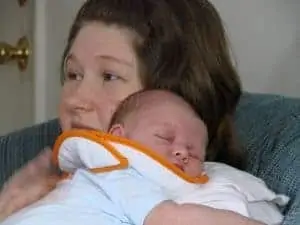Tiny baby farts can be adorable and funny, especially when they make silly faces to go along with the farts. It’s not so cute when your breastfed baby has stinky gas, and his poop smells like rotten eggs. Aren’t babies supposed to smell adorable?
Baby gas isn’t necessarily a problem on its own because everyone has gas, but when your newborn has gas that smells like sulfur, it might indicate something is wrong. It’s time to do some investigating. Foul odors often have an underlying cause, so let’s examine why your breastfeeding baby farts a lot and why his baby gas smells like rotten eggs.
Why Does My Breastfed Baby Fart So Much?
Farting is normal; we all do it. Gas builds up, and it has to come out one way or another. Most babies pass gas around 20 times per day.
The most common reason for excess gas is that your baby swallows too much air. It happens when they’re crying and eating. If your baby nurses in an awkward feeding position, it could cause him to take in too much air.
There are other reasons why your baby has smelly farts. Let’s take a look!
Immature Digestive Development
Your newborn baby’s stomach and digestive tract are immature and need time to get used to this whole eating thing. Some babies have average amounts of gas, but others have sensitive stomachs and need more time to develop.
Excess Air When Feeding
The extra gas has to come out some way, and if your baby doesn’t burp enough, it will come out the other end.
Pay attention to how you feed your baby. Different positions might cause your baby to take in excess air, or if you’re bottle-feeding, some don’t have enough vents to push out the air bubbles.
Food Sensitivity or Intolerance
Another reason for excess gas is diet problems. Have you ever eaten foods that caused you to be gassy? The same thing happens when you eat foods, and then they drink your breast milk. Certain foods can trigger gassiness. A few examples include:
- Dairy
- Caffeine
- Beans
- Broccoli
- Cabbage
- Brussels Sprouts
Constipation
Constipation is something that everyone faces from time to time. While constipation is more likely in formula-fed babies, it happens to all babies. If your baby has a lot of gas, it could be due to constipation, so pay attention to their bowel movements or lack thereof.
Excessive Crying

Crying is a baby’s only means of communication; some days, they cry a lot. The problem with excessive crying is that it might cause them to take in more air, leading to gassiness and farting.
That can cause belly aches and even more crying.
Medications
If your baby has to take medications for any reason, it might cause a change in digestion, leading to excess farting. Also, if a breastfeeding mother takes medications or supplements, it can cause the same problem in her baby.
Stress
We don’t typically think babies have stress, but they do. Babies can have anxiety and stress, just like adults, and they are intuitive enough to pick up on what their parents feed and what is happening around them. Stress causes digestive problems, so pay attention and help your baby relax.
What Causes a Baby to Have Smelly Gas but No Poop?
If your baby has many smelly farts but is not pooping, you start to wonder if something is wrong.
It’s not unusual for this to happen. Babies don’t have a set schedule for bowel movements, so if they have gas from time to time without pooping, don’t be too suspicious unless something else seems wrong.
Watch for signs of constipation. If your baby is struggling to pass stool and has frequent gas, it might be constipated your baby. Some other signs that your baby is constipated include:
- Hard time pooping
- Hard stools
- Stools that have streaks of blood
- Not pooping within five days
- Refusing to eat normally
- Swollen belly
- Bringing legs in a scrunched position
What Causes Smelly Gas in Breastfed Babies?
All breastfed babies eat is breast milk, meaning the smelly gas is caused by something in your breast milk. Gas-inducing foods might affect your baby, as well.

The problem is that it can be hard to determine the problem. It can be anything you ate over the last 72 hours, so if your baby has smelly gas often, start keeping a food diary.
Fiber-rich foods are at the top of the list, and all fruits can make you gassy as well. Green vegetables can trigger gas, such as broccoli, Brussels sprouts, cabbage, artichokes, and asparagus. Don’t forget garlic and onions as well.
Does your baby seem gassier in the mornings after your cup of coffee? Coffee and caffeine are triggers for gas; they often trigger gas in adults who suffer through it for their caffeine fix.
No, that doesn’t mean you must eliminate all foods from your diet. By keeping a food diary, you can pinpoint if specific foods are causing the gassiness.
Why Does My Baby’s Gas and Poop Smell like Rotten Eggs?
How can a baby stink so bad when all they do is drink breast milk or formula? Those are the culprit; something in the milk they’re drinking is causing the problem. Sulfur-smelling poop and farts aren’t limited to breastfed babies; it happens with formula-fed babies.
Let’s look at why this happens for both feeding methods.
Breastfed Babies
When your breastfed baby has poop that smells like rotten eggs, it’s normal to be concerned. Ultimately, breast milk comes from you, so something in your diet might be the culprit. Many foods can cause sulfur-smelling gas, such as:
- Eggs
- Dairy
- Broccoli
- Cabbage
If these stinky farts appear once in a while, it’s not a big deal, but if your baby has these smells all the time, it might be time to remove these sulfur-rich foods from your diet to see if it helps improve the stinky gas.
Formula Fed Babies

When your baby’s farts stink like sulfur, it’s most often because he’s struggling to digest the formula. Look to see if the formula contains lactose, which is often harsher on your baby’s digestive system. It can lead to gas with a bad odor.
If you notice that your baby has smelly gas and green poop, it might be an intolerance to the formula he drinks. This is an indicator that you need to discuss switching formulas with your pediatrician.
Finding the Culprit for Stinky Gas
When a baby has stinky gas, it all circles back to what they eat. Whether they’re formula-fed or breastfeeding, the same is true – what they eat alters the smell of their gas. Look at what your baby (or you) is eating to find the triggers for stinky gas.
Hey, this is Linda. My biggest accomplishment in life is being a mother of four children. Their current ages range from almost ten years old down to 20 months old.
I’m passionate about writing parenting articles because I understand so well all of the problems and trials you face as a parent. From breastfeeding woes to budgeting problems and behavior problems, along with everything in between, chances are I’ve faced it over the last ten years. Read more about Linda here.






